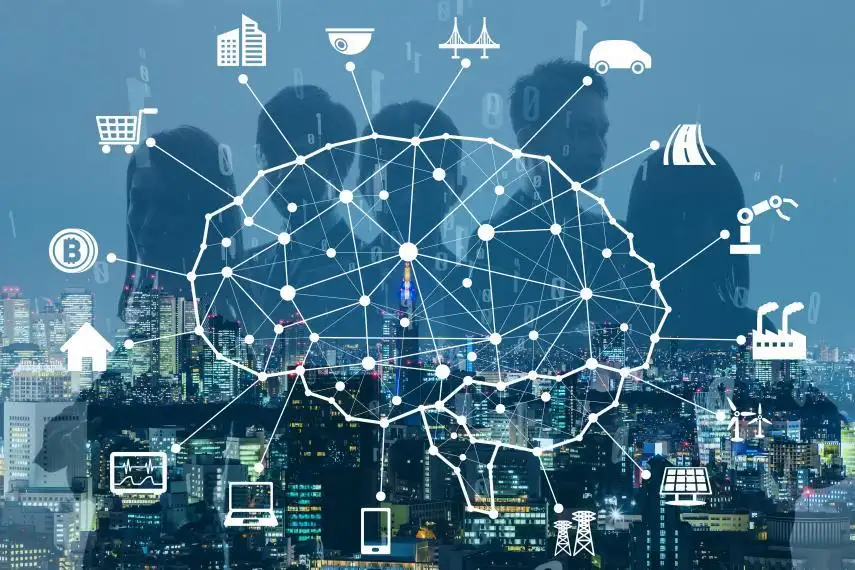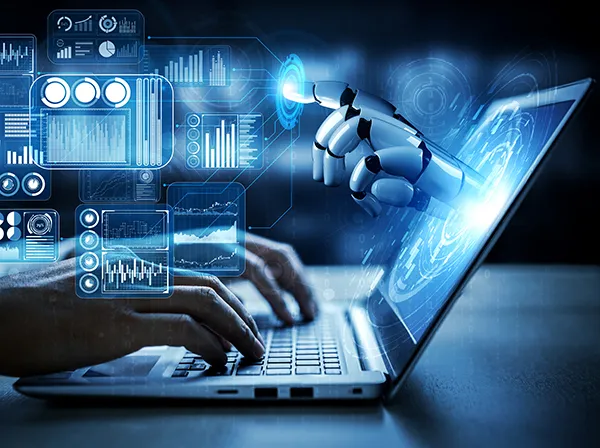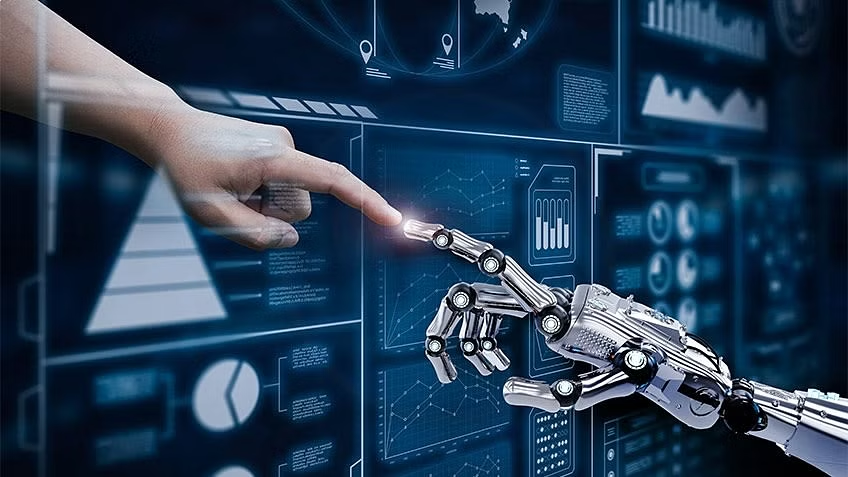Deep learning is driving significant advancements across multiple domains, influencing industries, scientific research, and everyday technologies. This section highlights more advanced innovations and future visions that are likely to shape the next frontier of deep learning.
Deep Learning in Quantum Computing
- Quantum Machine Learning:
- Hybrid Quantum-Classical Models: Researchers are developing hybrid quantum-classical models that leverage quantum computing to enhance deep learning algorithms. These models aim to solve complex problems faster and more efficiently than classical approaches.
- Quantum Neural Networks: Quantum neural networks utilize quantum computing principles to create novel architectures that could potentially outperform traditional neural networks in specific tasks, such as optimization and pattern recognition.
- Quantum Data Processing:
- Speed and Efficiency: Quantum computing offers the potential for exponential speed-ups in processing large datasets, which can enhance the performance of deep learning models. This includes faster training and inference times for complex models.
- Complex Simulations: Quantum computers can simulate quantum systems and processes that are challenging for classical computers, leading to new insights and advancements in fields such as chemistry, materials science, and cryptography.
Deep Learning in Advanced Robotics
- Autonomous Systems:
- Self-Learning Robots: AI models enable robots to learn and adapt autonomously by interacting with their environments and receiving feedback. This includes robots that can improve their performance over time without human intervention.
- Swarm Robotics: Deep learning supports swarm robotics by coordinating multiple robots to work together on complex tasks, such as search and rescue missions, environmental monitoring, and collective transportation.
- Human-Robot Collaboration:
- Assistive Robotics: AI-powered assistive robots support individuals with disabilities by performing tasks such as mobility assistance, communication aids, and daily living activities. This enhances quality of life and independence for users.
- Exoskeletons and Wearables: Deep learning drives the development of wearable exoskeletons that assist with physical tasks and rehabilitation. These devices provide support and enhance physical capabilities for users in various settings.
Deep Learning in Smart Cities
- Urban Planning and Management:
- Traffic Optimization: AI models analyze traffic patterns and optimize traffic flow in smart cities. This includes real-time adjustments to traffic signals and route planning to reduce congestion and improve transportation efficiency.
- Energy Management: Deep learning supports smart grids and energy management systems by predicting energy demand, optimizing energy distribution, and integrating renewable energy sources. This contributes to sustainable urban development.
- Public Safety and Security:
- Surveillance Systems: AI models enhance public safety by analyzing video feeds from surveillance cameras to detect and respond to security threats. This includes identifying suspicious behavior and monitoring large public events.
- Emergency Response: Deep learning supports emergency response systems by analyzing data from various sources, such as social media and sensors, to provide real-time alerts and coordinate response efforts during crises.
Deep Learning in Financial Services
- Fraud Detection:
- Transaction Monitoring: AI models analyze transaction data to detect fraudulent activities, such as credit card fraud and identity theft. This includes identifying unusual patterns and flagging suspicious transactions in real-time.
- Risk Assessment: Deep learning enhances risk assessment models by analyzing financial data and predicting potential risks. This supports decision-making in lending, investments, and insurance.
- Algorithmic Trading:
- Predictive Models: AI models develop predictive trading strategies by analyzing market data, trends, and historical patterns. This includes automating trading decisions and optimizing investment portfolios.
- Market Sentiment Analysis: Deep learning analyzes news, social media, and financial reports to gauge market sentiment and inform trading strategies. This provides insights into market trends and investor behavior.
Deep Learning in Personalized Education
- Adaptive Learning Platforms:
- Customized Learning Experiences: AI models create adaptive learning platforms that tailor educational content and activities to individual student needs and learning styles. This enhances engagement and improves learning outcomes.
- Real-Time Feedback: Deep learning provides real-time feedback to students by analyzing performance data and identifying areas for improvement. This supports personalized instruction and targeted interventions.
- Intelligent Tutoring Systems:
- Contextual Assistance: AI-powered tutoring systems offer contextual assistance and guidance based on students’ progress and difficulties. This includes personalized explanations, hints, and practice exercises.
- Skill Assessment: Deep learning assesses students’ skills and competencies by analyzing their work and performance. This supports accurate evaluation and progress tracking.
Deep Learning in Precision Agriculture
- Crop Monitoring and Management:
- Remote Sensing: AI models analyze remote sensing data from satellites and drones to monitor crop health, growth, and yield. This supports precision farming practices and optimizes resource use.
- Pest and Disease Prediction: Deep learning predicts pest outbreaks and disease progression by analyzing environmental data and historical patterns. This enables targeted interventions and minimizes crop damage.
- Soil and Water Management:
- Soil Analysis: AI models analyze soil data to assess nutrient levels, moisture content, and other factors. This supports precision soil management and optimized fertilizer application.
- Water Usage Optimization: Deep learning optimizes water usage by analyzing weather forecasts, soil moisture, and crop needs. This promotes efficient irrigation practices and water conservation.
Deep Learning in Space Exploration
- Space Mission Planning:
- Trajectory Optimization: AI models optimize spacecraft trajectories and mission parameters by analyzing data on celestial bodies and space environments. This enhances mission planning and execution.
- Autonomous Spacecraft: Deep learning powers autonomous spacecraft and rovers that can perform tasks such as navigation, data collection, and scientific experiments without human intervention.
- Extraterrestrial Research:
- Planetary Exploration: AI models analyze data from planetary missions to study the composition, geology, and potential habitability of extraterrestrial bodies. This supports the search for life and exploration of other planets.
- Astronomical Discoveries: Deep learning aids in discovering new celestial phenomena, such as exoplanets and astrophysical events, by analyzing large datasets from telescopes and observatories.
Future Visions in Deep Learning
- Explainable AI:
- Transparency and Interpretability: Future research focuses on developing explainable AI models that provide clear and understandable explanations for their predictions and decisions. This enhances trust and accountability in AI systems.
- User-Centric Design: AI models are designed with user-centric approaches that prioritize transparency and ease of understanding. This includes visualizations and explanations that facilitate user interaction and decision-making.
- AI for Social Good:
- Global Challenges: Deep learning is leveraged to address global challenges such as climate change, public health crises, and social inequality. AI models contribute to solutions that promote social welfare and environmental sustainability.
- Ethical AI Development: The development of ethical AI frameworks and guidelines supports responsible and fair AI practices. This includes addressing issues related to bias, privacy, and societal impact.
- Collaborative AI Systems:
- Human-AI Collaboration: Future AI systems emphasize collaboration between humans and machines, where AI augments human capabilities and supports creative problem-solving. This includes developing tools and interfaces that enhance human-AI interaction.
- Interdisciplinary Research: Collaborative research across disciplines, including computer science, neuroscience, and cognitive psychology, drives innovations in AI and deep learning. This fosters the development of more sophisticated and adaptive AI systems.
Conclusion
Deep learning continues to advance rapidly, driving innovation and transforming various sectors. As new technologies and applications emerge, deep learning will play a critical role in addressing complex challenges and creating opportunities for progress.
By exploring emerging trends, addressing ethical considerations, and fostering interdisciplinary research, we can harness the full potential of deep learning to benefit society and drive positive change.



